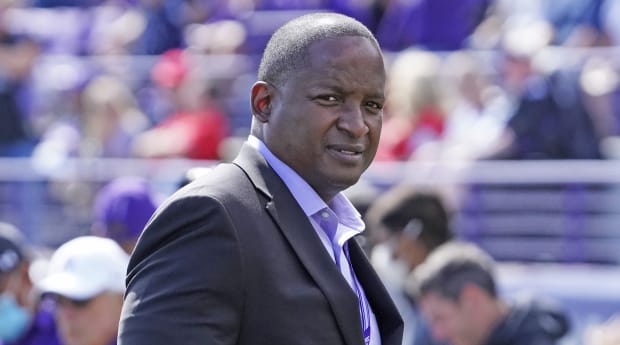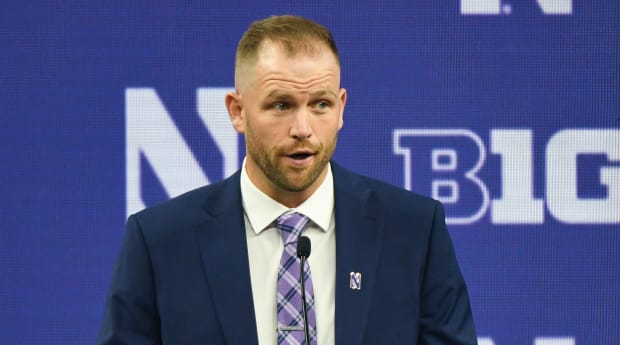INDIANAPOLIS — David Braun walked away from the podium and exhaled deeply, cheeks puffing, a thankless task completed, an impossible situation survived. He’d just done more than any of his no-account, hide-and-seek bosses at Northwestern University have done in weeks, by making himself available for an extensive public interview about the smoking crater of a football program he inherited.
Braun has been employed at Northwestern for less than six-and-a-half months. He’s been the emergency head football coach for 12 days. Yet he was thrown into Big Ten media days as the meat shield for a cowering university. Bless his heart, the guy handled it far better than expected. He may not win many (or any) games this season, but he absolutely won the press conference.
Which is one more press conference victory than Northwestern’s president, Michael Schill, or its athletic director, Derrick Gragg, have chalked up. It’s one more than they’ve even held since firing longtime coach Pat Fitzgerald after an investigation into alleged systemic hazing within the football program. The school’s leadership has handled just about every element of this scandal poorly, and Wednesday at Big Ten media days was a continuation of that.
Schill was not present, which isn’t unusual—this isn’t a president’s event. But it certainly is an athletic director’s event, and many of them were conspicuously present at Lucas Oil Stadium.
Illinois athletic director Josh Whitman stood just off the dais while his football coach, Bret Bielema, spoke. So did Michigan State AD Alan Haller while his coach, Mel Tucker, was on the stage. Penn State’s Pat Kraft and Ohio State’s Gene Smith were circulating on the stadium floor.

David Banks/USA TODAY Sports
Gragg? He was in the stadium, somewhere, but hard to find. He certainly wasn’t occupying the same prominent territory Whitman and Haller did while his coach addressed the main group of reporters. He talked to a couple of reporters individually. Later, through a league spokeswoman, he declined an interview request from Sports Illustrated. Then, he was a ghost while Braun put in 45 bracing (and human) minutes with the media in a heavily attended breakout session.
“I’ve been out of my comfort zone at times, many times, and that’s where a lot of growth has come,” Braun said, then laughed disarmingly. “I’ve never been this far outside my comfort zone before.”
Braun was out here beyond his comfort zone all by himself, yanked out of obscurity and sent to do everyone else’s PR work for them. There weren’t even any Northwestern players on hand. Players Bryce Gallagher, Rod Heard II and Bryce Kirtz issued a statement earlier this week declining to participate, saying, “we did not want our participation to be dominated by the hazing issue and steal the focus away from football and the upcoming season.”
While that’s understandable, there is also this reality: they’ve got to talk sometime. They need to answer to allegations of a locker-room culture tinged with weirdly sexual hazing traditions—because if those allegations are true, many past players (and likely some current ones) are culpable.
Everyone on the current team needs to be asked: What did they experience? Were they hazed? Who was doing the hazing? What did the coaches know, and when did they know it?
Investigations are ongoing. Lawsuits have accused other coaches still employed at Northwestern of having knowledge of the hazing. This isn’t going away anytime soon, and still could potentially get worse in terms of impact on the current staff and roster.
And if the current-day, circle-the-wagons Northwestern mentality is as strong as Braun portrayed it, then the players need to say so. Braun unwittingly highlighted the missed opportunity Wednesday.
When asked what will change the ugly narrative surrounding the program, Braun answered: “Putting our players on full display, they will change that conversation and that narrative. Anyone who has had the opportunity to meet the young men that are part of Northwestern football will know that they are men of character, integrity, toughness, grit, highly intellectual, selfless individuals that are awesome to coach.”
There were no Northwestern football players on display Wednesday. No chance to meet them. No opportunity to see those positive attributes.
Just David Braun, who had never even coached in an FBS program—much less a Power Five program—until January. His career stops before Northwestern: Winona State, Culver-Stockton, UC Davis, Northern Iowa, North Dakota State. (Truth be told, North Dakota State is a better program than many in FBS, and even a few at the Power Five level.) Now he’s a Big Ten head coach, for the time being.

Robert Goddin/USA TODAY Sports
Despite the small-college pedigree, Braun provided the first non-embarrassing representation of Northwestern in the last several weeks. His voice caught and eyes watered at one point Wednesday when talking about the support he’s received since being thrust into this position. That starts with his wife, Kristin, who gave him the following advice Tuesday night about handling his public remarks: “Go be you.”
Kristin, by the way, is due “any day” with the Brauns’ third child. The amount of life circumstances coming at David Braun this month truly boggles the mind.
He’s trying to shore up team morale and prevent a mass transfer portal exodus—which includes actually getting to know many of the offensive players he hadn’t interacted with much before. He’s trying to prepare the team for the imminent start of training camp. He’s trying to take on leadership of the coaching staff. He’s trying to improve a team that went 1–11 last year and now has been rocked by scandal.
And he’s trying to become the public face of the program, with absolutely no discernible help so far. David Braun, stopgap interim coach, may or may not succeed in that role. But he’s already more than Michael Schill, Derrick Gragg and the rest of the Northwestern leadership team deserve.







